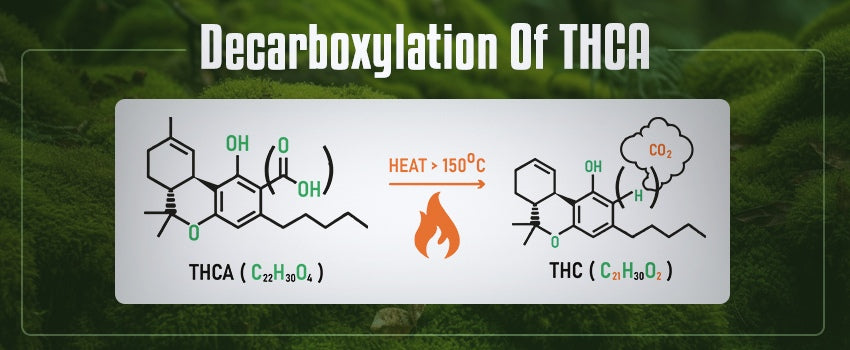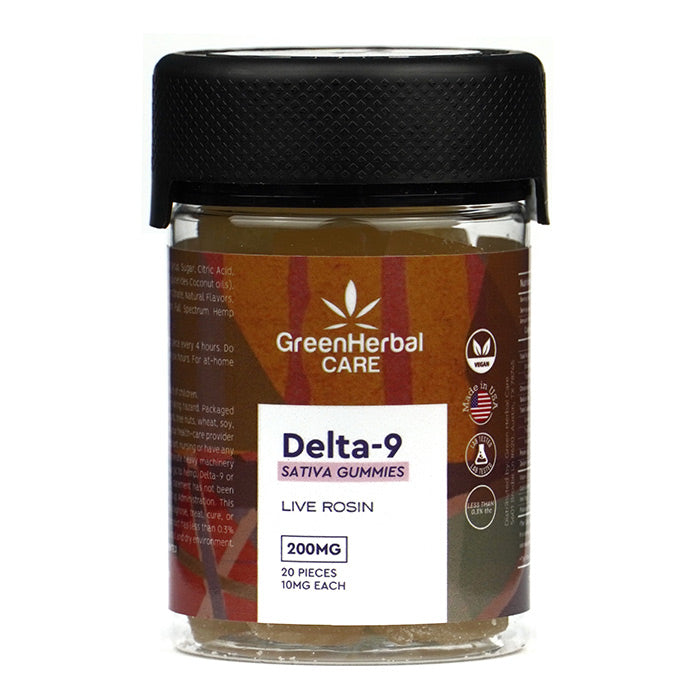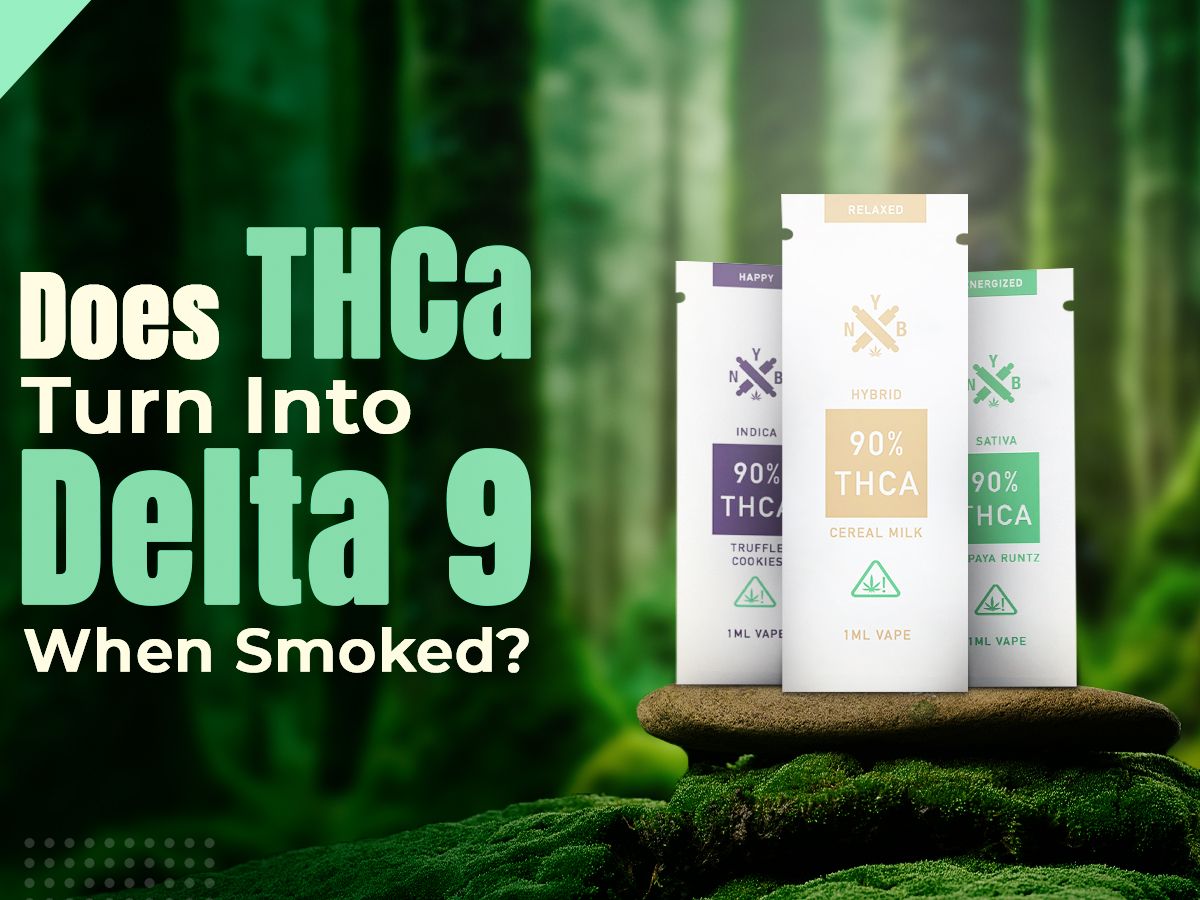Yes, it does. Smoking THCa turns it into Delta 9 THC when smoked or heated through a process called decarboxylation. But that’s not the only answer you seek. If you are on this page, you are here to understand how it happens, and we’ve got you covered. This blog discusses the decarboxylation process that facilitates this conversion and the various factors that influence it.
To understand how THCa turns into Delta 9, we look into these chemical compounds and their properties. Let’s go.
Does THCA Get You High?Understanding THCa and Delta-9 THC
Both are cannabis-derived cannabinoids. Cannabis, as you know, has been used for centuries by races known and unknown for its medicinal properties. However, it wasn’t until the 60s that researchers could isolate and identify the different chemicals that caused the effects people used them for. These chemical compounds, a.k.a cannabinoids, are many, and we only know about a hundred. THCa and Delta 9 THC are only two of them.
THCa:
THCa, a non-psychoactive compound, occurs in raw and live cannabis plants. It does not create a high but is rich in therapeutic traits like anti-inflammation, anti-emetic, and neuroprotection.
Delta 9 THC:
Tetrahydrocannabinol (THC) is the primary psychoactive component of cannabis. It creates the euphoric high recreational users enjoy. THCa is its precursor; when heated, it undergoes decarboxylation and transforms into THC. Delta 9 THC is commonly found in products such as Delta 9 gummies Texas, where they are popular for both recreational and medicinal use.
Is Delta 9 Legal in Texas?The Decarboxylation Process

This process is critical to the preparation of cannabis for consumption. It is crucial in determining the effects cannabis delivers since it converts THCa into THC. Once you know what this process is, you will understand how smoking cannabis influences these compounds.
Decarboxylation removes a carboxyl group from THCa through heat and light exposure, which activates cannabis’s psychoactive properties. The process has specific time and temperature requirements to produce the desired outcome without deteriorating the compound quality.
Shop Delta 9 THC Products
Extreme temperatures, high or low, can degrade the conversion. The ideal temperature ranges between 220°F and 240°F over 30-60 minutes. However, it depends on the chosen method.
There are many other critical factors to consider, such as moisture content, surface area, and application method, which affect the speed and efficiency of the process. So, meticulous care and management are necessary to maximize conversion and maintain quality. Let’s break it down a bit further.
- Temperature:A specific heat range triggers the conversion without damaging the components. Time is also crucial for full conversion.
- Moisture:If the cannabis is too dry, it may not decarboxylate efficiently. So, ensuring adequate moisture content is necessary.
- Surface Area:The more surface area exposed to heat, the better the process runs. Some grind the cannabis before decarboxylation for more surface area.
- Application Method:What is the perfect method? A sous vide machine or slow cooker can convert better than an oven.
Smoking and Decarboxylation
Most users smoke cannabis, which directly affects decarboxylation, converting THCa into Delta 9 THC, but the process is much more complicated.
Smoking THCa flower uses the flame’s heat to decarboxylate the cannabinoid, converting it to THC. The smoke enters the bloodstream through the lungs, binding to cannabinoid receptors in the brain and producing a high. The smoke also carries the properties of terpenes and other cannabinoids, which have unique effects on the body and mind.
Remember, smoking THCa products like THCa pre rolls reaches temperatures as high as 1000°F.
Does Delta-9 Show Up On A Drug Test?Alternative Methods of Decarboxylation
Apart from smoking, Various other methods can decarboxylate cannabis, converting THCa into THC. If you are a non-smoker, you can choose one of these methods.
- Vaping: It involves using a THCa disposable vape or heating THCa wax or flower at high temperatures to trigger the desired effects. However, the temperature is below combustion levels and does not burn the material. Instead, it used convection heating. Vaping may be more efficient than smoking because it regulates the temperature, which prevents the degradation of the cannabinoids or by-product formation.
Shop THCA Products
- Cooking: Mixing cannabis into edibles is one of the best alternatives to smoking cannabis. It enables sufficient decarboxylation. For proper conversion, heat the product in an oven or with oil or fat for a specific duration and temperature. Also, consider the dosage and potency when cooking with cannabis. The potency of homemade edibles can differ significantly.
Conclusion
So, decarboxylation is possible with or without smoking. All you need is even heating following the right guidelines to convert THCa products into Delta 9 products and enjoy the psychoactive effects they create. If you do not want the intoxicating properties of cannabis, consume raw THCa.
Frequently Asked Questions
Is THCA as good as Delta 9?
THCa and Delta 9 are cannabis-derived cannabinoids but with different properties and effects. THCa is non-psychoactive, but Delta 9 has intoxicating properties. Whether one is as good as the other depends on the desired result. THCa supposedly has more therapeutic potential because of its interaction with the ECS, but it won’t produce a high like Delta 9.
Does burning THCA turn into Delta 9?
Yes, heating THCa, such as burning it, converts it into Delta 9 THC. It happens through decarboxylation, where it loses a carboxyl group, activating the psychoactive compound.
How does THCA convert to Delta 9?
Through decarboxylation, where heat is the primary catalyst for conversion. Heating THCa by smoking or cooking removes the carboxyl group (COOH) from it, transforming it into the intoxicating Delta 9 THC.
What does THCA do when smoked?
Smoking THCa is smoking THC because heat activates its psychoactive effects. Consuming raw THCa with beverages or other edibles delivers therapeutic effects.


